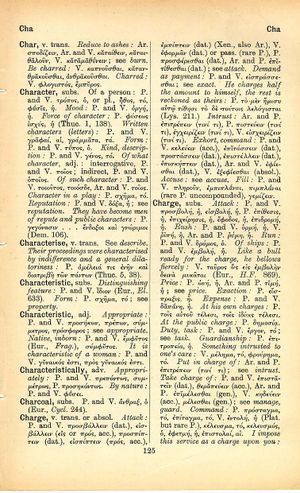char: Difference between revisions
From LSJ
Πᾶσα γυνὴ χόλος ἐστὶν· ἔχει δ' ἀγαθὰς δύο ὥρας, τὴν μίαν ἐν θαλάμῳ, τὴν μίαν ἐν θανάτῳ → Every woman is an annoyance. She has two good times: one in the bedroom, one in death.
(CSV3) |
m (Woodhouse1 replacement) |
||
| Line 1: | Line 1: | ||
{{Woodhouse1 | {{Woodhouse1 | ||
|Text=[[File:woodhouse_125.jpg|thumb|link={{filepath:woodhouse_125.jpg}}]] | |Text=[[File:woodhouse_125.jpg|thumb|link={{filepath:woodhouse_125.jpg}}]] | ||
===verb transitive=== | |||
[[reduce to ashes]]: [[Aristophanes|Ar.]] [[σποδίζειν]], [[Aristophanes|Ar.]] and [[verse|V.]] [[καταίθειν]], [[καταιθαλοῦν]], [[verse|V.]] [[καταμαθύνειν]]; see [[burn]]. | |||
[[be charred]]: [[verse|V.]] [[καπνοῦσθαι]], [[κατανθρακοῦσθαι]], [[ἀνθρακοῦσθαι]]. | |||
[[charred]]: [[verse|V.]] [[φλογιστός]], [[ἔμπυρος]]. | |||
}} | }} | ||
Revision as of 08:55, 20 May 2020
English > Greek (Woodhouse)
verb transitive
reduce to ashes: Ar. σποδίζειν, Ar. and V. καταίθειν, καταιθαλοῦν, V. καταμαθύνειν; see burn.

